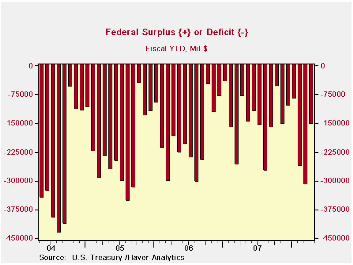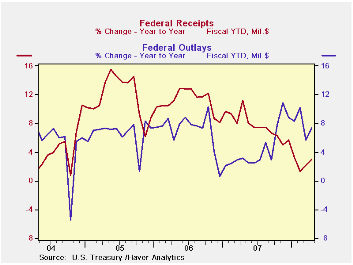 Global| May 12 2008
Global| May 12 2008U.S. April Budget Surplus Down, 2008 FYTD Deficit Nearly Doubled
by:Tom Moeller
|in:Economy in Brief
Summary
As it usually does in April, the U.S. government ran a budget surplus of $159.3B. The figure was down slightly, however, from last year's unusually large April surplus of $177.7B. Based on expectations formed by Public Debt [...]

As it usually does in April, the U.S. government ran a budget surplus of $159.3B. The figure was down slightly, however, from last year's unusually large April surplus of $177.7B. Based on expectations formed by Public Debt Transactions from the Daily Treasury Statement, the budget surplus equaled the Consensus forecast. These Transactions data are available in Haver's DAILY database.
For the first seven months of FY08 the government ran a budget deficit of $152.2B; nearly double the deficit of $80.8B during the first seven months of FY07.
For the fiscal year to date, federal receipts grew a paltry 3.0% from a year earlier. That compared to 11.2% y/y growth during the first seven months of FY07. Higher unemployment constrained the growth in individual income tax receipts (44% of total receipts) to 6.0% this year. Seventeen percent y/y growth had been logged during the first seven months of FY07. Growth in withheld income taxes of 5.6% was roughly half that of a year earlier and non-withheld taxes grew 7.3%, or roughly one quarter as during the first seven months of FY07.
Lower corporate profitability continued to crimp government revenues. Corporate income taxes (13% of total receipts) amounted to $207.0B, a 6.0% decline from receipts during the first seven months of FY07. During FY07 they rose 13.4% during the first seven months.
Unemployment insurance contributions fell 2.7% FYTD due to negative employment growth and Federal excise taxes fell 1.1%.
U.S. net outlays grew 7.4% during the first seven months of FY08, more than double the outlay growth of FY07's first seven months. Growth in defense spending (19% of total outlays) also nearly doubled to a 10.6% growth rate but Medicare expenditures (12% of outlays) grew a much slower 2.1%. Growth in Social Security spending (21% of outlays) held about steady at 5.4% and interest expense grew 8.6%, held back by the recent decline in interest rates. Growth in outlays for income security (15% of outlays) held steady at 15.1% and health spending (10% of the total) grew 5.7%.
The Government's financial data is available in Haver's USECON database.
How Do EITC Recipients Spend Their Refunds? from the Federal Reserve Bank of Chicago can be found here.
Financial Market Tremors: Causes and Responses is from Dallas Federal Reserve Bank President Richard W. Fisher and it is available here.
| US Government Finance | April | March | Y/Y | FY 2007 | FY 2006 | FY 2005 |
|---|---|---|---|---|---|---|
| Budget Balance | -$48.1B | -$175.6B | -$96.3B (3/07) | -$162.0B | -$248.2B | -$318.7B |
| Net Revenues | $178.9 | $105.7B | 7.4% | 6.7% | 11.8% | 14.1% |
| Net Outlays | $227.0 | $281.3B | -13.4% | 2.8% | 7.4% | 7.6% |
Tom Moeller
AuthorMore in Author Profile »Prior to joining Haver Analytics in 2000, Mr. Moeller worked as the Economist at Chancellor Capital Management from 1985 to 1999. There, he developed comprehensive economic forecasts and interpreted economic data for equity and fixed income portfolio managers. Also at Chancellor, Mr. Moeller worked as an equity analyst and was responsible for researching and rating companies in the economically sensitive automobile and housing industries for investment in Chancellor’s equity portfolio. Prior to joining Chancellor, Mr. Moeller was an Economist at Citibank from 1979 to 1984. He also analyzed pricing behavior in the metals industry for the Council on Wage and Price Stability in Washington, D.C. In 1999, Mr. Moeller received the award for most accurate forecast from the Forecasters' Club of New York. From 1990 to 1992 he was President of the New York Association for Business Economists. Mr. Moeller earned an M.B.A. in Finance from Fordham University, where he graduated in 1987. He holds a Bachelor of Arts in Economics from George Washington University.
More Economy in Brief
 Global| Feb 05 2026
Global| Feb 05 2026Charts of the Week: Balanced Policy, Resilient Data and AI Narratives
by:Andrew Cates






